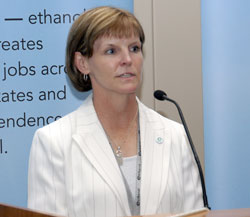 At the Iowa Speedway yesterday, the Iowa Corn Growers Association held an outdoor press conference. They used it to help educate media about corn usage by placing banners on the side of a grain trailer showing the relative percentages of corn used for different purposes like livestock feed and ethanol.
At the Iowa Speedway yesterday, the Iowa Corn Growers Association held an outdoor press conference. They used it to help educate media about corn usage by placing banners on the side of a grain trailer showing the relative percentages of corn used for different purposes like livestock feed and ethanol.
I did a short interview with Gary Edwards, ICGA board member. Ken Root, WHO, also participated. Gary farms in Animosa, IA which is in one of the most flood impacted areas of the state. He says that although corn growth is behind schedule and there is a lot of land impacted, he expects that the state will still have a good crop. He wants people to keep in mind that last year they had a record corn crop and this year still has the potential to be one of the biggest. He says the water levels have gone down significantly already and he expects that a lot of those fields will dry out and be re-planted. He has no doubt that they’ll be able to provide all the corn needed for both food and fuel again this year.
You can listen to my interview with Gary here: [audio:http://www.zimmcomm.biz/epic/iowa-08-edwards.mp3]


 “The industry is at a point where the next evolution is here. You know it’s at the next phase.” Toni Nuernberg, the new Executive Director of the
“The industry is at a point where the next evolution is here. You know it’s at the next phase.” Toni Nuernberg, the new Executive Director of the 


 This year’s Iowa Corn Indy 250 is over and as usual, ethanol won. Actually, Dan Wheldon, Target Chip Ganassi Racing won the race.
This year’s Iowa Corn Indy 250 is over and as usual, ethanol won. Actually, Dan Wheldon, Target Chip Ganassi Racing won the race.  The Iowa Corn Indy 250 is underway here at Iowa Speedway and the weather is perfect.
The Iowa Corn Indy 250 is underway here at Iowa Speedway and the weather is perfect.  The qualifying session for the Iowa Corn Indy 250 got rained out last night so unfortunately that means the drivers will start according to their points standing. That was a blow to Team Ethanol. The car was performing very well and would likely have had a much better starting position. Ryan Hunter-Reay, who spoke at the EPIC member reception last night, says he’ll make up for it though.
The qualifying session for the Iowa Corn Indy 250 got rained out last night so unfortunately that means the drivers will start according to their points standing. That was a blow to Team Ethanol. The car was performing very well and would likely have had a much better starting position. Ryan Hunter-Reay, who spoke at the EPIC member reception last night, says he’ll make up for it though. “Policy Risks and Consequences for the Biofuels Industry” will be one of the topics addressed during a Farm Foundation conference entitled
“Policy Risks and Consequences for the Biofuels Industry” will be one of the topics addressed during a Farm Foundation conference entitled  Meyer says they found that the two main important factors in any scenario are the price of oil and feedstock production.
Meyer says they found that the two main important factors in any scenario are the price of oil and feedstock production.  The Ethanol Car wound up practice in the top 10 with a combined (2 sessions) lap speed of 183.114.
The Ethanol Car wound up practice in the top 10 with a combined (2 sessions) lap speed of 183.114.